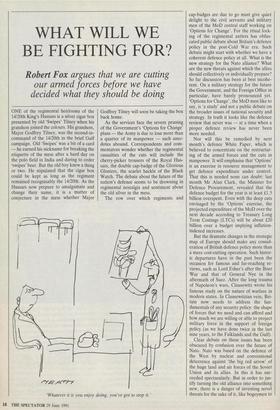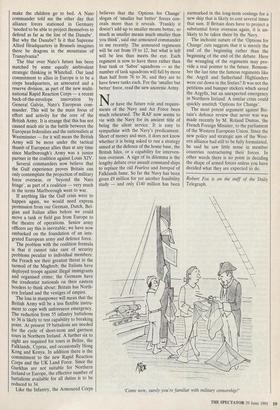WHAT WILL WE BE FIGHTING FOR?
Robert Fox argues that we are cutting
our armed forces before we have decided what they should be doing
ONE of the regimental heirlooms of the 14/20th King's Hussars is a silver cigar box presented by old 'Swipes' Tilney when his grandson joined the colours. His grandson, Major Godfrey Tilney, was the second-in- command of the 14/20th in the brief Gulf campaign. Old 'Swipes' was a bit of a card ŌĆö he earned his nickname for breaking the etiquette of the mess after a hard day on the polo field in India and daring to order `swipes' beer. But the old boy knew a thing or two. He stipulated that the cigar box could be kept as long as the regiment remained recognisably the 14/20th. As the Hussars now prepare to amalgamate and change their name, it is a matter of conjecture in the mess whether Major Godfrey Tilney will soon be taking the box back home.
As the services face the severe pruning of the Government's 'Options for Change' plans ŌĆö the Army is due to lose more than a quarter of its manpower ŌĆö such anec- dotes abound. Correspondents and com- mentators wonder whether the regimental casualties of the cuts will include the cherry-picker trousers of the Royal Hus- sars, the double cap-badge of the Glorious Glosters, the scarlet hackle of the Black Watch. The debate about the future of the nation's defence seems to be drowning in regimental nostalgia and sentiment about the old silver in the mess.
The row over which regiments and 'Whatever it is you enjoy doing, you've got to stop it.' cap-badges are due to go must give quiet delight to the civil servants and military men of the MoD central staff working on `Options for Change'. For the ritual lock- ing of the regimental antlers has obfus- cated public debate about Britain's defence policy in the post-Cold War era. Such debate might start with whether we have a coherent defence policy at all. What is the new strategy for the Nato alliance? What are the new threats against which the allies should collectively or individually prepare? So far discussion has been at best incohe- rent. On a military strategy for the future the Government, and the Foreign Office in particular, have barely pronounced yet. `Options for Change', the MoD men like to say, is 'a study' and not a public debate on the broader issues of national security and strategy. In truth it looks like the defence review that never was ŌĆö at a time when a proper defence review has never been more needed.
Nor will this be remedied by next month's defence White Paper, which is believed to concentrate on the restructur- ing of the armed forces and the cuts in manpower. It will emphasise that 'Options' is an exercise in resource management to get defence expenditure under control. That this is needed none can doubt: last month Mr Alan Clark, the Minister for Defence Procurement, revealed that the defence budget for the year is at least ┬Ż1.5 billion overspent. Even with the deep cuts envisaged by the 'Options' exercise, the projected expenditure of the MoD over the next decade according to Treasury Long Term Costings (LTCs) will be about ┬Ż20 billion over a budget implying inflation- indexed increases.
But the dramatic changes in the strategic map of Europe should make any consid- eration of British defence policy more than a mere cost-cutting operation. Such histor- ic departures have in the past been the occasion for famous and far-reaching re- views, such as Lord Esher's after the Boer War and that of General Nye in the aftermath of Suez. After the long trauma of Napoleon's wars, Clausewitz wrote his famous study on the nature of warfare in modern states. In Clausewitzian vein, Bri- tain now needs to address the fun- damentals of any security policy: the shape of forces that we need and can afford and how much we are willing or able to project military force in the support of foreign policy (as we have done twice in the last nine years, to the Falklands and the Gulf).
Clear debate on these issues has been obscured by confusion over the future of Nato. Nato was based on the defence of the West by nuclear and conventional deterrence against 'the big red arrow' of the huge land and air forces of the Soviet Union and its allies. In this it has suc- ceeded spectacularly. But in order to jus- tify turning the old alliance into something new, there is a danger of inventing novel threats for the sake of it, like bogeymen to make the children go to bed. A Nato commander told me the other day that alliance forces stationed in Germany 'needed to be able to project themselves to defend as far as the line of the Danube'.
But why the Danube? Is it that Supreme Allied Headquarters in Brussels imagines there be dragons in the mountains of Transylvania?
The blur over Nato's future has been matched by some equally ambivalent strategic thinking in Whitehall. Our land commitment to allies in Europe is to be a corps headquarters, an armoured and a reserve division, as part of the new multi- national Rapid Reaction Corps ŌĆö a recent back-of-the-envelope innovation by General Galvin, Nato's European com- mander. This will be the main focus of effort and activity for the core of the British Army. It is strange that this has not caused much stir in the battle between the European federalists and the nationalists at Westminster ŌĆö for it will mean the British Army will be more under the tactical thumb of European allies than at any time since Marlborough's Army was a junior partner in the coalition against Louis XIV. Several commanders now believe that the Gulf experience proves Britain can only contemplate the projection of military force overseas, or 'beyond the Nato fringe', as part of a coalition ŌĆö very much in the terms Marlborough went to war.
If anything like the Gulf crisis were to happen again, we would need express permission from our German, Dutch, Bel- gian and Italian allies before we could move a tank or field gun from Europe to the theatre of operations. Senior army officers say this is inevitable; we have now embarked on the foundation of an inte- grated European army and defence force. The problem with the coalition formula is that it cannot take care of security problems peculiar to individual members: the French see their greatest threat in the turmoil of the Maghreb; the Italians have deployed troops against illegal immigrants and organised crime; the Germans have the irredentist nationals on their eastern borders to think about; Britain has North- ern Ireland and the vestiges of empire.
The loss in manpower will mean that the British Army will be a less flexible instru- ment to cope with unforeseen emergency. The reduction from 55 infantry battalions to 36 is likely to test capability to breaking point. At present 19 battalions are needed for the cycle of short-term and garrison tours in Northern Ireland. A further six to eight are required for tours in Belize, the Falklands, Cyprus, and occasionally Hong Kong and Kenya. In addition there is the commitment to the new Rapid Reaction Corps and the UK Land Force. Since the Gurkhas are not suitable for Northern Ireland or Europe, the effective number of battalions available for all duties is to be reduced to 34.
Like the Infantry, the Armoured Corps believes that the 'Options for Change' slogan of 'smaller but better' forces con- ceals more than it reveals. 'Frankly it doesn't add up to smaller means better, so much as smaller means much smaller than you think', said one armoured commander to me recently. The armoured regiments will be cut from 19 to 12, but what is left will be less than meets the eye. Each regiment is now to have three rather than four tank or 'Sabre' squadrons ŌĆö so the number of tank squadrons will fall by more than half from 76 to 36, and they are to have fewer tanks each. For the 'smaller but better' force, read the new anorexic Army.
Nor have the future role and require- ments of the Navy and Air Force been much rehearsed. The RAF now seems to vie with the Navy for its ancient title of being the silent service. It is easy to sympathise with the Navy's predicament. Short of money and men, it does not know whether it is being asked to run a strategy aimed at the defence of the home base, the British Isles, or a capability for interven- tion overseas. A sign of its dilemma is the lengthy debate over assault command ships to replace the old Fearless and Intrepid of Falklands fame. So far the Navy has been given ┬Ż9 million for yet another feasibility study ŌĆö and only ┬Ż140 million has been earmarked in the long-term costings for a new ship that is likely to cost several times that sum. If Britain does have to project a substantial force overseas again, it is un- likely to be taken there by the Navy.
The inchoate nature of the 'Options for Change' cuts suggests that it is merely the end of the beginning rather than the beginning of the end of the debate. Here the wrangling of the regiments may pro- vide a real pointer to the future. Remem- ber the last time the famous regiments like the Argyll and Sutherland Highlanders were cut down in the Sixties? It was not the petitions and bumper stickers which saved the Argylls, but an unexpected emergency in Northern Ireland. A similar crisis could quickly unstitch 'Options for Change'.
The most potent argument against Bri- tain's defence review that never was was made recently by M. Roland Dumas, the French Foreign Minister, to the parliament of the Western European Union. Since the new policy and strategic aim of the West- ern alliance had still to be fully formulated, he said he saw little sense in member countries restructuring their forces. In other words there is no point in deciding the shape of armed forces unless you have decided what they are expected to do.
Robert Fox is on the staff of the Daily Telegraph.
'Come now, surely you're familiar with military censorship?'



















































 Previous page
Previous page